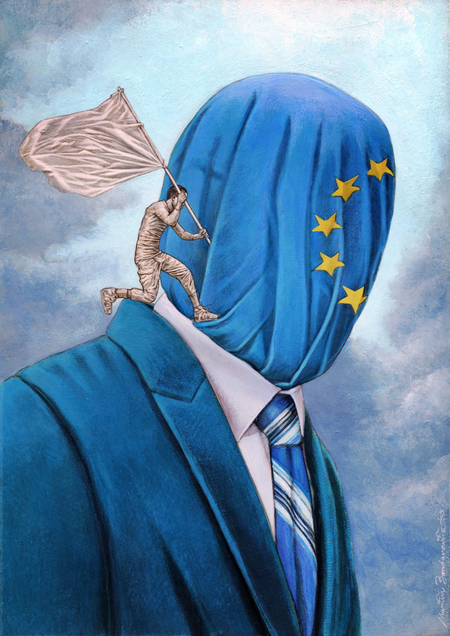What country do we want to be?
The case of 250 Syrian refugees is a reminder: European integration is unworkable when governed by the principle “For us, everything; from us, nothing”
Media have spread the news that 250 refugees from Syria will be resettled in Yahotyn, a city near Kyiv. Precisely for this purpose, the authorities have allocated a family dormitory which was being built for the families of Chernobyl disaster liquidators. The building is to be repaired at the EU and local government’s expense and will then house the Syrians. It seems a noble and good thing to do, but it has caused some resentment among people involved, including residents of Yahotyn. The latter demand the building to be allocated to displaced persons from the Donbas. The city hall complains that the migration service never inquired beforehand what the local authority or residents of Yahotyn thought of this idea.
It turns out that a country which obviously is unable to cope with the problem of “internally displaced persons” shows to Europe remarkable tolerance and care for migrants from the Middle (Near) East, which some officials evidently treat as something nearer than our own Ukrainian east. Ukraine is involved in a long war and unable to solve tough issues facing citizens who have been forced to leave their homes in the Donbas. Moreover, the government itself often creates these issues. We still ignore the fact that the very act of crossing the line of contact often turns into hellish experience for residents of the occupied territories, and this despite the fact that no terrorist has ever been caught at these checkpoints. The position of former head of the Donetsk Military-Civilian Administration Oleksandr Kikhtenko is worth remembering here, since he was against the introduction of the permit regime from the very beginning. It is obvious that the regime was introduced not so much for catching dangerous individuals (recall, please, that organizers of the Russian Spring in the Donbas are doing quite well in Kyiv, and some of them have even entered the Verkhovna Rada), but as another source of corruption income. It brings millions a day, even as the authorities lament the lack of funds for helping victims of the Russian aggression.

Sketch by Marcin BONDAROWICZ
Chief coordinator of the NGO Donbas SOS Oleksandr Horbatko commented for The Day: “I think this is a case of populism. We plan to shelter refugees from Syria even as we have a lot of our people under fire and unable to move out because they have nowhere to go. No public funding for relevant programs is provided. These things make an impact on our society. It is being artificially divided into those who sympathize with displaced persons from the Donbas and those who do not accept their presence. Sometimes the government itself artificially creates issues and then tries to solve them. For example, the pension payments system was from the start focused only on internally displaced persons, and not on those who remained in the occupied territory. The government thus promoted division of our people into those who have a right to a pension and those who do not have such a right.”
Let us recall that not only term limits for permits, but stamps to be affixed on the back of the certificate by the State Migration Service (SMS) as well were abolished by law on January 6. Checks of displaced persons’ actual addresses have been abolished, and they have no duty now to inform the SMS about their actual place of residence. In practice, it appears that the law is not just highly flexible (like the proverb has it, “it is like the shaft of a cart which points wherever you turn it”), but officials are roundly ignoring it altogether.
In fact, displaced persons are looking for jobs and sponsors on their own. They create relevant associations and NGOs. Over a year and a half, the government has not implemented any program to build affordable housing, provide benefits, etc. During this time, not even a dedicated body has been set up to thoroughly study and deal with issues of internal migration and problems of the Donbas caused by the war. This particularly affects the campaign to launch a consolidated lawsuit against the aggressor country. This vast layer of problems has effectively been left to citizens themselves, whose activities include litigating claims against Russia. So, instead of a systemic effort, the government once again displays a semblance of activity.






